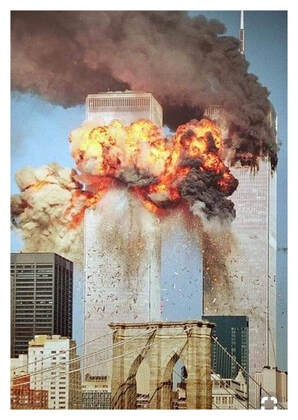|
“Nothing makes us believe more than fear, the certainty of being threatened. When we feel like victims, all our actions and beliefs are legitimised, however questionable they may be. Our opponents, or simply our neighbours, stop sharing common ground with us and become our enemies. We stop being aggressors and become defenders. The envy, greed or resentment that motivates us becomes sanctified, because we tell ourselves we’re acting in self-defence. Evil, menace, those are always the preserve of the other. The first step towards believing passionately is fear. Fear of losing our identity, our life, our status or our beliefs. Fear is the gunpowder and hatred is the fuse. Dogma, the final ingredient, is only a lighted match.”
-- Zafon, Carlos Ruiz, 2010. The Angel’s Game (English trans.), Phoenix, p. 247 A very ambiguous “angel” (or perhaps a psychotic fantasy) visits an exploited Spanish writer with a commission. The writer is to write a novel that presumably will serve as a substitute holy scripture for a new generation. Ominous as this turns out to be, the “angel” tells the author the rationale that is to be used: When we feel like victims, all our actions and beliefs are legitimised … we become defenders. …The first step towards believing passionately is fear. That passage arrested me. “That,” I thought, reaching for my pen, “is profound.” What made it profound, in my mind, among the myriad of profundities laid before us in this time of unprecedented availability of literature and wisdom, is how it capsulizes the motivations of so many of our responses to threats. Or at least some of the motivations. But, having reflected on the terrorist attack on the World Trade center these past few days, and thereby brooding about “America”, on September 11, 2001, I think the “angel” was over-simplifying the range of human reactions. On 9/11 anger, victimization, and alienation were NOT the first responses. At least we have chosen stories of heroism, gallant sacrifice, and patriotism to be remembered. Some of those stories are on their way to becoming legends. But those stories also refer to fear. The account of half a million people being moved by boats from Manhattan to New Jersey by heroic sailors operating ferry boats and pleasure craft, “the largest marine evacuation in history,” is also about 500,000 people trying to escape. The images of 9/11 are not of only brave fire-fighters going into smoking and blazing towers but of people running for their lives. It’s complicated. But has the “angel” got it right, that the root of belief is fear? It is possible to see the US government’s responses pretty much as the “angel” described them. “We were attacked. So we retaliated.” In fact, what was released at that time was more extensive and intense. We learned in one terrible morning that the USA is vulnerable after all. That led to: “This is not to be stood for. America needs to defend itself. The world is undependable. We need leaders who will restore us. We need to be able to defend ourselves … we need guns … we need to proud and keep out illegal, undesirable, and unnecessary foreign elements”. Those attitudes blossomed and spread. Zafón was describing Spain, especially his native Barcelona, after the Spanish Civil War and during the dictatorship of Franco. He is also narrating the legitimization of terror and revenge in his novels. It is state terror, but it plays out in particular incidents with indistinct chains of cause. Zafón “divides his time between Barcelona and Los Angeles,” the dust jacket of his book tells us. He knows that the “angel” was enunciating a universal truth. It applies to Croatia, China, Cambodia, and Cuba and it threatens unity and cooperation whenever it takes hold. Does legitimate religion adequately counter this fear? Christian theology struggles as it tries to say it does. In some way even God is to be feared. Fear is basic. Some kind of fear is fine. Buddhism is a search for serenity in eternal uncertainty and change. Some religions try appeasement … some through unspeakable sacrifices and others through metaphorical ones. Without fear that whole apparatus (some say “all religion”) would be unnecessary. So, religion does counter fear although some strategies are paradoxical. Sadly, religion as we have it these days, does not always serve to keep fear from being transformed into defensiveness, too often manifested as counter-terror, and soon enough into a belief system. The writer in Zafon’s novel comes to believe that the “Angel’s game” was to scare the writer into writing about fear as the seed of belief so as to make it happen. It remains unclear at the novel’s end whether that would have worked on a universal scale, or whether the “angel” was only working on the writer. If fear is the impetus for a protectionist belief system that legitimizes violent opposition and the consequences that come from that, love and compassion are the other alternative. Love and compassion are only sustainable, however, when we are not scared to death. We can only be loving and compassionate when we are not overwhelmed by fear. Zafón knows, and we know, that some religion has surrendered to angels’ temptations to fight terror with terror. The question we need to answer before it’s too late for us is whether there is a better way that actually works. I think the “angel” was right that if we feel threatened fear will abduct our belief system. Unless we feel protected, really taken care of despite everything, we are vulnerable to a system that turns us against our neighbor and renders us hopelessly lonely. [Credit the New York Times, for the picture accompanying this essay.]
0 Comments
Leave a Reply. |
AuthorRev. Dr. Kenneth Dobson posts his weekly reflections on this blog. Archives
March 2024
Categories |
| Ken Dobson's Queer Ruminations from Thailand |
|

 RSS Feed
RSS Feed
